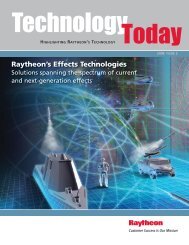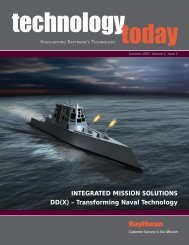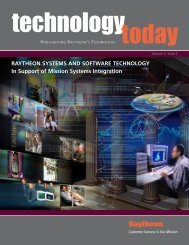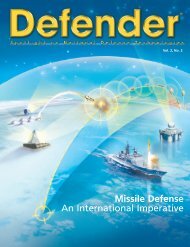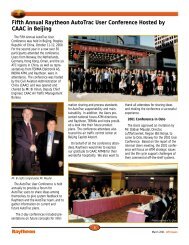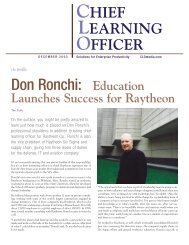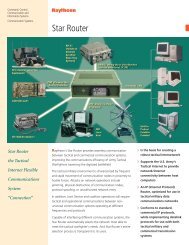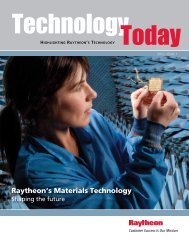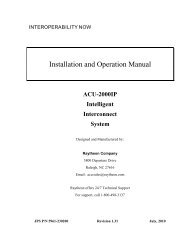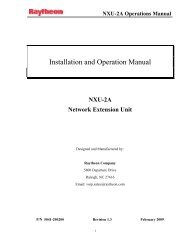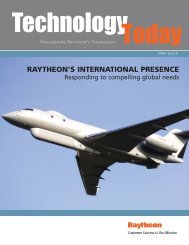2007 Issue 3 - Raytheon
2007 Issue 3 - Raytheon
2007 Issue 3 - Raytheon
You also want an ePaper? Increase the reach of your titles
YUMPU automatically turns print PDFs into web optimized ePapers that Google loves.
LEADERS CORNER<br />
Dr. Peter Boland<br />
Vice President<br />
Corporate Engineering<br />
Recently Technology Today talked<br />
with Peter Boland, vice president of<br />
corporate Engineering, about the<br />
role of Engineering at <strong>Raytheon</strong> and the<br />
challenges it faces in driving growth.<br />
He also discussed his career at <strong>Raytheon</strong>,<br />
the value of diversity, and what earlycareer<br />
engineers can do to advance in<br />
the company.<br />
TT: What role do <strong>Raytheon</strong>’s engineers<br />
play in the success of the company?<br />
PB: <strong>Raytheon</strong>’s engineers contribute to<br />
the company in two main areas. The first<br />
is innovation. <strong>Raytheon</strong> is known as a<br />
technology company. It’s expected that<br />
<strong>Raytheon</strong> is always on the leading edge of<br />
technologies in our markets. We depend<br />
on our engineering staff and our technology<br />
staff to keep <strong>Raytheon</strong> at the forefront<br />
of technology and innovation.<br />
The other major category, especially in<br />
today’s environment, is program performance.<br />
If <strong>Raytheon</strong> is going to continue to<br />
grow, and if our customers are going to<br />
become an advocate of <strong>Raytheon</strong> on various<br />
programs, especially the area of<br />
Mission Systems Integration, <strong>Raytheon</strong> has<br />
to perform very well on its programs. In<br />
addition, we have to make sure that we<br />
keep all of our promises to our customers.<br />
In doing so, it is critical for the engineering<br />
staff, who is the engine of the success<br />
of these programs, to understand precisely<br />
what responsibilities they have, as well as<br />
being accountable for the work they do.<br />
TT: Why is accountability so important?<br />
PB: I firmly believe that <strong>Raytheon</strong> has<br />
world-class people in Engineering. Where<br />
we sometimes fall short is in the area of<br />
accountability. The challenge for leadership,<br />
management and supervisors is to continually<br />
hone this great talent by providing clear<br />
processes, standards and expectations.<br />
That discipline will enable us to serve our<br />
customers to our fullest potential.<br />
One of the ways to do that is by focusing<br />
more on Performance Excellence. We need<br />
to make sure we understand things like<br />
contractual requirements, and better manage<br />
our subs and suppliers. We really need<br />
to treat our subs, suppliers and partners as<br />
just another <strong>Raytheon</strong> IPT. As a result, many<br />
of our key goals in Engineering address the<br />
need for accountability, continuous learning<br />
and process discipline. If we can excel in<br />
these areas, I believe we will be unbeatable.<br />
TT: So will engineers also have to<br />
become Performance Excellence or<br />
Quality professionals?<br />
PB: No, not exactly, but they need to help<br />
drive these processes. At the end of the<br />
day, program leadership and leadership<br />
teams aren’t the only ones responsible for<br />
Performance Excellence, Engineering is<br />
too. If we don’t do get behind it, it’s not<br />
going to get done the way it should.<br />
TT: What other challenges does<br />
Engineering face?<br />
PB: An upcoming challenge for <strong>Raytheon</strong><br />
is going to be maintaining growth during<br />
the inevitable decline in U.S. defense<br />
spending. When this happens, a potential<br />
area of growth is in the Mission Systems<br />
Integration or the MSI arena.<br />
This will require Engineering to do several<br />
things. One, it requires that we do systems<br />
engineering to a much higher level than<br />
we have done in the past. And, [it<br />
requires] that we develop requirements<br />
from the systems level, from the mission<br />
systems level, all the way down to components<br />
and parts that we supply.<br />
Increased MSI work will also require that<br />
<strong>Raytheon</strong> have a larger number of partners<br />
— meaning we’ll be dealing with a<br />
larger number of subcontractors and<br />
suppliers. We are going to need to learn<br />
how to manage such organizations outside<br />
of our own environment, much better<br />
than we do today, if we’re really going to<br />
grow in that arena.<br />
That will necessitate better program management<br />
skills, better technical skills, more<br />
discipline and following our own processes,<br />
as well as ensuring that our detailed<br />
processes get flowed down to all of our<br />
partners and contractors, etc.<br />
That’s going to be a significant challenge<br />
for our engineers, and we’re working very<br />
hard in that direction right now with the<br />
Engineering staff, program management,<br />
Supply Chain and Performance Excellence<br />
organizations.<br />
It requires a slightly different skill set than<br />
most of our engineers have today. They<br />
need to understand how to adapt to it. In<br />
fact, we’ve been training engineers in<br />
those areas. They’ve been very willing and<br />
excited about moving forward in that area.<br />
TT: Can you provide some examples of<br />
how Engineering is working to improve<br />
our MSI capability and skills?<br />
PB: Systems engineering is essential to<br />
our growth. To emphasize that, I have<br />
brought one of the company’s most senior<br />
and experienced systems engineers onto<br />
my staff, Brian H. Wells. Although Brian is<br />
<strong>Raytheon</strong>’s chief systems engineer, a key<br />
responsibility he has is to grow our systems<br />
engineering capabilities through people,<br />
learning, accountability and mentoring.<br />
Brian is working closely with the Systems<br />
Engineering Council to develop common<br />
competency models, improve our processes<br />
and develop people at all levels. He is<br />
working with the corporate learning<br />
organization and local universities to<br />
improve systems engineering learning. At<br />
every opportunity, as Brian traverses our<br />
businesses, he makes sure to visit with<br />
systems engineering leadership to instill<br />
the merits of process discipline and both<br />
functional and individual accountability.<br />
Continued on page 16<br />
RAYTHEON TECHNOLOGY TODAY <strong>2007</strong> ISSUE 3 15



